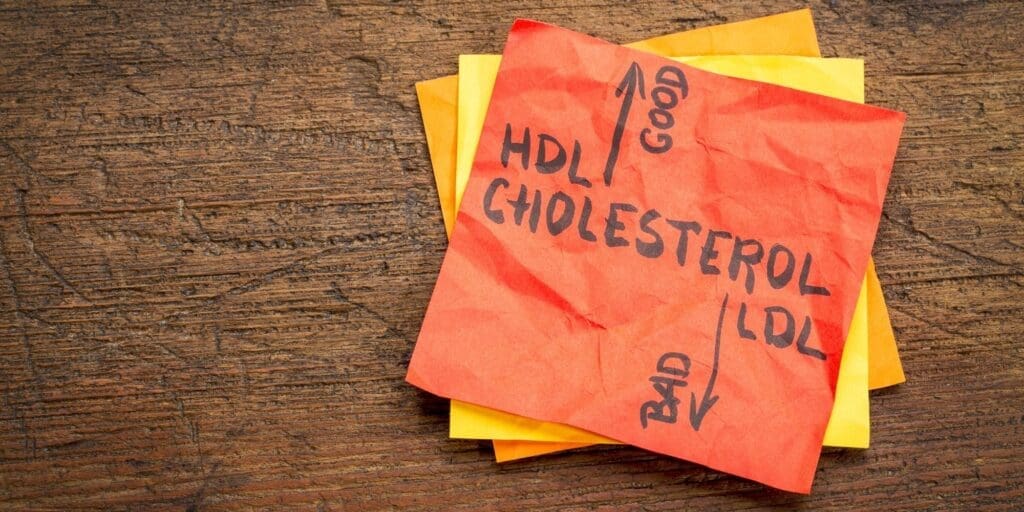Cholesterol is one of those words that we all know, but we don’t actually know. Chances are you’ve likely heard of good and bad cholesterol, as well as high and low cholesterol, but what do those terms mean when they come to your health? Moreover, what do these terms mean for people who live with chronic pain? To better understand the ins and outs of cholesterol, as well as how high cholesterol can affect certain pain conditions, we’ve put together a comprehensive guide of everything you need to know about high cholesterol. First, let’s start by understanding what cholesterol is.
What Is Cholesterol?
Cholesterol is a type of lipid, which are any class of organic compounds that are fatty acids or their derivatives that are insoluble in water. Your liver naturally produces cholesterol, which helps regulate the formation of cell membranes, certain hormones, and vitamin D.
Cholesterol is a waxy, fat-like substance that does not dissolve in water. This means that it is unable to travel through your bloodstream on its own. To help transport cholesterol throughout your body, your liver also produces what are known as lipoproteins.
Lipoproteins are a group of soluble proteins that combine with and transport fat or other lipids throughout the blood and plasma. These particles are made from fat and protein and help carry your cholesterol and triglycerides, another type of lipid, throughout your body.
There are two major forms of lipoproteins: low-density lipoprotein (LDL) and high-density lipoprotein (HDL). LDL and HDL are likely better known by their nicknames: “bad cholesterol” and “good cholesterol” respectively. But, what are the differences between these two types of cholesterol? Let’s take a look.
What’s the Difference Between Good and Bad Cholesterol?

Cholesterol is a vital part of a healthy, properly functioning body. Your body uses cholesterol to help make hormones, vitamin D, and to aid in digestion. Your liver produces enough cholesterol to keep these tasks up and running, however, your body doesn’t get cholesterol from just your liver.
The most common way cholesterol enters your body aside from your liver is through food. Cholesterol can be found in many foods, such as meats and dairy products. If you eat a lot of these foods, your cholesterol levels may become too high.
The two major types of cholesterol, as previously mentioned, are LDL and HDL, which we’ll take a closer look at next.
LDL Cholesterol, or “Bad Cholesterol”
LDL cholesterol is often referred to as “bad cholesterol” because it takes cholesterol to your arteries, where it can build up and form plaque in your artery walls. Too much cholesterol in your arteries can lead to a buildup of plaque known as atherosclerosis. This can increase your risk of blood clots in your arteries, which can cause a heart attack or stroke.
HDL Cholesterol, or “Good Cholesterol”
HDL cholesterol, on the other hand, is typically called “good cholesterol.” This type of cholesterol helps return LDL cholesterol to your liver to be removed from your body. This helps control the buildup of cholesterol plaque in your arteries, and in doing so lowers your risk of heart disease and stroke.
Controlling your cholesterol levels can be tricky, and for some people with chronic pain, can be a constant battle even with the right mitigation efforts. Understanding what causes high cholesterol levels can help you better manage your cholesterol levels, and help you determine what steps you need to take to get your cholesterol under control.
What Causes High Cholesterol?
Several factors can contribute to high cholesterol levels. The first, and most common, cause of high cholesterol is diet. Eating too many foods that are high in cholesterol, saturated fats, and trans fats may increase your risk of high cholesterol. Other lifestyle factors that can cause high cholesterol include inactivity and smoking.
High cholesterol is also understood to have a genetic component. Certain genes instruct your body on how to process and deal with cholesterol and other fats. If you have a parent or close relative with high cholesterol, you may be at a higher risk of developing it too.
In very rare cases, high cholesterol may be caused by a condition called familial hypercholesterolemia. This genetic disorder causes your body to be unable to remove LDL cholesterol.
Several health conditions can cause high cholesterol levels. These include conditions such as diabetes and hypothyroidism, both of which are known to have high cholesterol-related complications.
Certain studies have shown that outside factors such as exposure to childhood abuse or trauma may increase your risk for high cholesterol as an adult. Other studies have also found that socioeconomic deprivation may be a strong risk factor for early death related to cardiovascular complications, such as high cholesterol.
Symptoms of High Cholesterol
For the vast majority of people, high cholesterol is a silent, symptomless condition. Many people are unaware that they have high cholesterol levels and may remain unaware until they develop serious, sometimes life-threatening, complications such as heart disease or stroke.
Since high cholesterol is such a silent condition, most health officials and experts agree that routine cholesterol screening is important. For those 20 years or older, ask your doctor about routine cholesterol screening. Currently, the American Heart Association recommends getting your cholesterol checked every four to six years. For those with a family history of high cholesterol or those who may be at increased risk, your doctor may recommend getting your cholesterol checked more frequently.
How to Lower Your Cholesterol


If you’re living with high cholesterol, your doctor may recommend making some changes to your lifestyle to help regulate your cholesterol levels. These changes may include simple dietary modifications like avoiding foods high in fat, or including regular exercise in your daily routine. If you’re a smoker, your doctor will likely recommend you quit.
One of the most common ways your doctor will recommend you lower your cholesterol is through your diet. This is the easiest way to have an impact on your cholesterol levels, as the foods you eat directly affect your cholesterol. Below, we’ll look at how you can lower your cholesterol through your diet.
Lowering Your Cholesterol Through Diet
Lowering your cholesterol through your diet is an easy, effective way to keep your cholesterol levels where they need to be. While this method may not be enough for everyone, for many it can help keep your cholesterol levels in balance, and help lower your risk of heart disease and stroke.
Some simple ways to do this include:
- Limit your intake of foods high in cholesterol, saturated fats, and trans fats
- Avoid fast food and sugary, ultra-processed foods when possible
- Opt for leaner proteins, such as chicken or fish, rather than red meats
- Choose baked, steamed, or air fried foods rather than fried foods
- Eat foods high in fiber, such as fruits, vegetables, and whole grains
While diet and exercise may be adequate for most people, for some, managing cholesterol levels may include medications, which we’ll cover next.
Cholesterol Medications
In cases where diet alone isn’t enough, your doctor may recommend taking medications to help keep your cholesterol levels under control. One of the most common types of medications used to help with cholesterol is called statins. Statins block your liver from producing more cholesterol, which can help reduce cholesterol levels.
Commonly prescribed statins include:
- Atorvastatin (Lipitor)
- Fluvastatin (Lescol)
- Rosuvastatin (Crestor)
- Simvastatin (Zocor)
While managing your cholesterol can be difficult, doing so isn’t impossible. Diet, exercise, and medications can all be effective ways to help you lower your cholesterol levels. They can also help reduce your risk of heart disease and stroke. If you’re worried about your cholesterol, or if you’d like to learn more about what you can do to keep your cholesterol levels under control, talk with your doctor about what options are available to you.
Have More Questions About High Cholesterol?
Ask us in the comments section below!
What topics related to high cholesterol should we cover next?
Email us your ideas at info@painresource.com!
Looking for more information on how you can lower your cholesterol?
Become a member of the brand new Pain Resource Community today to start connecting with thousands of other chronic pain warriors! Signing up is free, simple, and instantly gives you access to exclusive content, resources, and exciting giveaways! Join today by clicking here!




